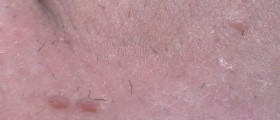
Vulvovaginitis is inflammation that at the same time affects the inner lining of the vagina and vulva. This condition affects women of all ages, predominantly women in their reproductive years. Inflammation of the vagina and vulva may be caused by different bacteria, yeasts and viruses and sometimes even parasites.
Sexually transmitted disease are frequently associated with vulvovaginitis. However, sometimes inflammation of the lining of these two organs may not be connected with microorganisms. In that case it is highly likely that the mucous membrane gets inflamed due to harsh chemical found in bubble baths, soaps and perfumes.
Vulvovaginitis is also reported in postmenopausal women in whom the level of estrogen is reduced. And finally, there is nonspecific vulvovaginitis affecting all age groups, particularly young girls. It is associated with poor vaginal hygiene.
Treatment for Vulvovaginitis
The condition can be easily confirmed during gynecological exam. The underlying cause of inflammation, however, requires further tests and exams.
Doctors usual take samples from the affected area (vagina swab test) and sent them to the lab. After testing samples, one may be confirmed to have bacterial, viral, fungal or parasitic infection. If none of the mentioned microorganisms is confirmed, the inflammation is of different origin and usually is connected with different cosmetic products. Once these are replaced, the inflammation soon subsides.
In women who are confirmed to suffer from infections caused by different microorganisms, inflammation of the vagina and vulva is easily brought under control with medications efficient against particular infective agent. Most women are prescribed drugs in a form of vaginaletes or vaginal creams.
Additional help is obtained from improved perineal hygiene and sitz baths. By wearing cotton underwear or at least underwear with cotton lining in the crotch area the infection will heal faster. Such underwear is supposed to be worn all the time. Artificial materials such as nylon are major contributors to vulvovaginitis.
Any confirmation of sexually transmitted disease means that both partners must be treated at the same time. Left untreated such infection can eventually cause infertility.
Prevention of Vulvovaginitis
The best way to prevent vulvovaginitis associated with sexually transmitted diseases is to use condom during each sexual intercourse.
Proper fitting underwear made of cotton and adequate hygiene of the genital area are essential for maintaining health of the vagina and vulvar area.
Little girls must be learned to properly clean the genital area while bathing and to wipe themselves from the front to the back. By doing so, the transfer of bacteria from the colon to the vulvar area will be successfully prevented.

















Your thoughts on this
Loading...